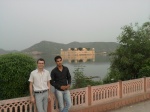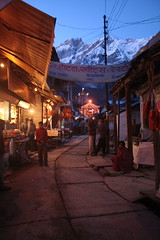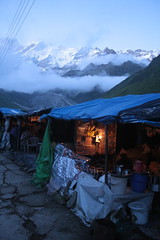I have many memories of my grandfather hooking us into his favorite mantra. “Alright, I’m going,” he’d say as he’d make a motion to get up and leave.
“Where are you going, grandpa?” we’d ask excitedly. We want to come!
“I’m going to Calcutta to see your mutta, and your fatta, and your brutta, and your sista.”
I’m almost certain he coined this himself; who else but an old German (chermin) could craft such a rhyme? Although we eventually grew wise of the saying, it has stuck with me. When discussing with other CLS participants where we’d be going for our midterm break, I couldn’t resist telling them that I’d be in search of their parents and siblings.

The morning of arrival via sleeper train.
We chose to travel via sleeper train since it was barely a quarter the cost of airfare. The 26.5-hour ride was not nearly as miserable as expected, in fact it was quite enjoyable. I’m traveling with the three girls I live with — but due to our last-minute ticket reservation, we were split between two cars. One of the girls and I slept in 3AC, an air-conditioned box split into compartments for six people. Our compart-mates were a family from Kolkata, returning home from a trip to Agra.

The Kolkatan boy from the train.
They didn’t speak English but were very eager to talk with us in the limited Hindi we knew. They showed us the ropes of ordering the train food (a garlicky paneer and onion dish, rice, and roti), told us all about their friend who lives in Los Angeles (everyone in India has a friend in New York or L.A.) and snapped a picture of their two-year-old son sitting with us.
Kolkata, renamed from the British Calcutta in 2001, is a massive, thriving city, which was immediately apparent when we stepped off the train into the crowded station. Outside of Sealdah, the rail terminal, were rows and rows of yellow Ambassador Classic taxis. We bartered in the usual way to get to the tourist hotel neighborhood. The heat, humidity, and rain render this the off-season for tourism, so we were in sparse white company. After a few price-checks, we bathed our bodies of the train-sweat, ate a lovely dinner at Gaylord Restaurant, and called it a day.
The next morning, I awoke early to roam the neighborhood before we’d head to the Victoria Memorial. Not twenty paces from the door of the hotel, a beggar woman latched onto me and refused to yield to my attempted stone-cold indifference. She carried an infant in her arms; he was wearing only a cloth diaper and looked very malnourished, he was missing patches of hair and had sores on his body. “Please sir, only milk for my baby.” She led me to a store down the road, where I eventually bought her two large cylinders of powdered milk, spending my own daily allotment for food. She was not yet satisfied though, and continued to follow me for another block and ask for rice, lentils, fruit.
Another woman walked next to me for a couple blocks — she spoke very good, clear English and talked about her family and aspirations as I played with her friend’s son. Gita asked me to buy her rice and lentils to feed her family, but I told her I didn’t have money with me and would return later. On my way back to the hotel, I was swept with privileged guilt and took a detour through the food market to get her a kilo of each. I talked with the shopkeeper in broken Hindi for a while, explaining why I was in Kokata, learning Hindi, and buying raw rice and lentils. He told me that a lot of the beggar women will ask tourists to buy them food and then sell it back to the shopkeeper at a slightly reduced price to make an income. Feeling slightly cheated (but not wanting to doubt Gita), I still purchased the items and dropped them off with her before leaving the neighborhood for the day.

The men in the back left of this picture were bathing outside our hotel every morning.
I met up with the girls and we walked through the city’s largest park on our way to the Victoria Memorial. The week before our arrival, the city hosted what appeared to be a massive Hindu festival. Booths and circus tents were being torn down on either side of the path, but some of the signs were still hung:
Instead of thinking that man is the center of the universe, the idea should be to understand that man is part of the universe… Therefore we should take care of the environment because man will ultimately kill himself if he doesn’t.
Root cause of Pollution in the world is the pollution in the ecology of the human heart, pollution caused by toxic greed, egotism, and selfish exploitation of nature. Whatever change we make in outward world, only has sustainability only to the degree those changes are paralleled within our hearts.
A few soccer teams played in the field just past the fairgrounds while goat-herders pushed their flock through the tall grass and horses roamed freely.
Upon reaching the end of the park, we were approached by two Nigerian men who claimed to play for the Goa soccer team. They seemed excited to see white people, and insisted we exchange phone numbers so we could smoke hash with their “homiez” (qtd. from a text I later received). I attempted to give them a fake number, but they called it so I would have their number and were relentless to get my real number. They texted me frequently in the evening, and called about ten times the next morning until I blocked their number.

The photo the old man from Varanasi insisted on taking.
We finally reached the memorial; unfortunately the interior was closed for the day, so we were confined to the massive, well-kept palace grounds. We wandered for a while, and I ended up talking with an old man from Varanasi about the best places to see in Kolkata and Darjeeling. He gave me hand-written slips of paper detailing the must-see locales and how to get to them via local transportation. His English was exceptional, his understanding of American culture was not. After explaining to him that we indeed do not have a caste system, he gave up on trying to understand how our backwards society functioned. He told me that no matter what American society was like, my mother would surely want to see a picture of me in front of the palace, and took my camera from my hands and directed me to stand near the gate. We talked for a little while longer, and I snapped a picture of him and handed a few American $1 bills as tokens for his daughters.

The projection machinery at Birla Planetarium.
Our next stop was to be the Academy of Fine Arts — this was also closed for the day (I guess Monday is not the day for tourism), so we continued down the road in search of a restaurant. We passed the Birla Planetarium, something I had already wanted to see, just in time for their Hindi showing. Everyone around us was concerned that we were in the wrong line and we were repeatedly told, “The English showing is at 1.30, this showing is in Hindi.” We’d respond, “Yes, we want to see this one. We are learning Hindi,” at which point their eyes would grow and they’d say, “Oooh, good, good, good, good” in Hindi. The content was portrayed slowly enough and simply enough for us to understood a fair amount.
After severely overeating at Marco Polo, the girls were too rotund to continue in the afternoon and opted for a nap. I roamed through the streets, eventually making it to a market near our hotel. A man began talking to me about his friend in Los Angeles and after a few minutes asked me to visit his shop, which just opened that day. I was not only their first sale of the day, but their first sale in the new shop, which meant that my happiness was absolutely crucial to their future success. I had in mind that I wanted small statues of Durga and Kali, who both represent female empowerment, for some friends, and they showed me their inventory of such at length. After making my purchase, they insisted I smoke a cigarette with them for “auspiciousness,” and then I returned to the hotel.
The first day in Kolkata ended with us at a rooftop restaurant overlooking the city. Kolkata has completely surprised me in its cleanliness, organization, and vibrance. I’m sad to say that I have yet to find your mutta, but Granda, in the future you may have to come to Kolkata to find me.
*I’ve also uploaded selected pictures from our days in Kolkata to my Flickr account.
Tags: excursions, kolkata, poverty, sleeper train, Tourist














